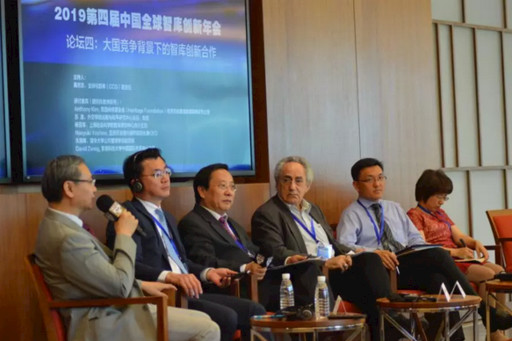Forum discusses innovative think tank development
Author : ZHAO SANLE Source : Chinese Social Sciences Today 2019-06-18

Scholars hold discussions at the fourth annual China Global Think Tank Innovation Forum. Photo: CCG
Co-organized by the Think Tanks and Civil Societies Program (TTCSP) and the Centre for China and Globalization, the fourth annual China Global Think Tank Innovation Forum was held in Beijing on May 28. Discussion centered on topics including cooperation among think tanks worldwide and innovative and sustainable think tank development.
In the opening speech, James G. McGann, director of the TTCSP, emphasized the role of innovation and transformation. The improvement and progress of think tanks can only be achieved when they stay in tune with the times and develop new solutions to current challenges.
Christopher A. Preble, vice president for Defense and Foreign Policy Studies at the Cato Institute, said that think tanks can be more innovative when communicating and disseminating their work. Social media, for example, can be used to disseminate research results more effectively.
Alistair Michie, secretary-general of the British East Asia Council (BEAC), suggested that dialogue and communication across different cultures is more important than ever in the current complex and rapidly changing global geo-political landscape.
Tim Summers, senior consulting fellow of the Asia-Pacific Program at the Royal Institute of International Affairs, suggested that we need well-rounded analysis of the issue and to take in different perspectives to tackle global challenges. China is rising to be an important power and have more political, economic and cultural influence globally. The world needs Chinese wisdom and opinions to resolve global issues.
According to Summers, Chinese think tanks can provide the world with Chinese wisdom. They can also promote dialogue and mutual learning among think tanks by hosting international summits. In terms of conversation and mutual learning between Chinese and foreign think tanks, it is not only about translating think tank research results into other languages, but also about enabling mutual understanding of key concepts. When Chinese think tanks interpret their findings to foreign audiences, it would help if the Chinese discourse system were more widely accepted.
Summers added that more cross-disciplinary research, which enables researchers to look at problems from different perspectives, is desirable. So long as think tank research has appropriate research methods and provides evidence that is robust and stands up to scrutiny, the research quality will be good regardless of the field of research.
McGann suggested that cross-disciplinary research offers a bird’s-eye view of the issue and makes research findings more valuable. Think tanks can thus provide policy makers with multiple perspectives on the issue as well as alternative solutions. According to Preble, interdisciplinary research and cross-department cooperation among researchers is helpful for inspiring more innovative ideas.
McGann said that, with government support, Chinese think tanks have been rising in quantity and improving in quality, hence entering the golden age of think tank development. Chinese think tanks should focus more on research methods and spread their results abroad. Specifically, they need to step up efforts on building their websites and make them available in multiple languages. Also, to increase their impact and reach a wider audience, Chinese think tanks need to develop electronic versions of their publications, so that people both at home and abroad can access think tank research findings with ease.
Ye Shengtao made Chinese fairy tales from a wilderness
Ye Shengtao (1894–1988) created the first collection of fairy tales in the history of Chinese children’s literature...
-
How northern ethnicities integrated into Chinese nation
2023-09-18
-
Mogao caves
2023-09-12
-
Mogao Grottoes as ‘a place of pilgrimage’
2023-09-12
-
Time-honored architectural traditions in China
2023-08-29
-
Disentangling the civilizational evolution of China
2023-08-28
-
AI ethics in science fiction
2023-08-23














 2011-2013 by www.cssn.cn. All Rights Reserved
2011-2013 by www.cssn.cn. All Rights Reserved